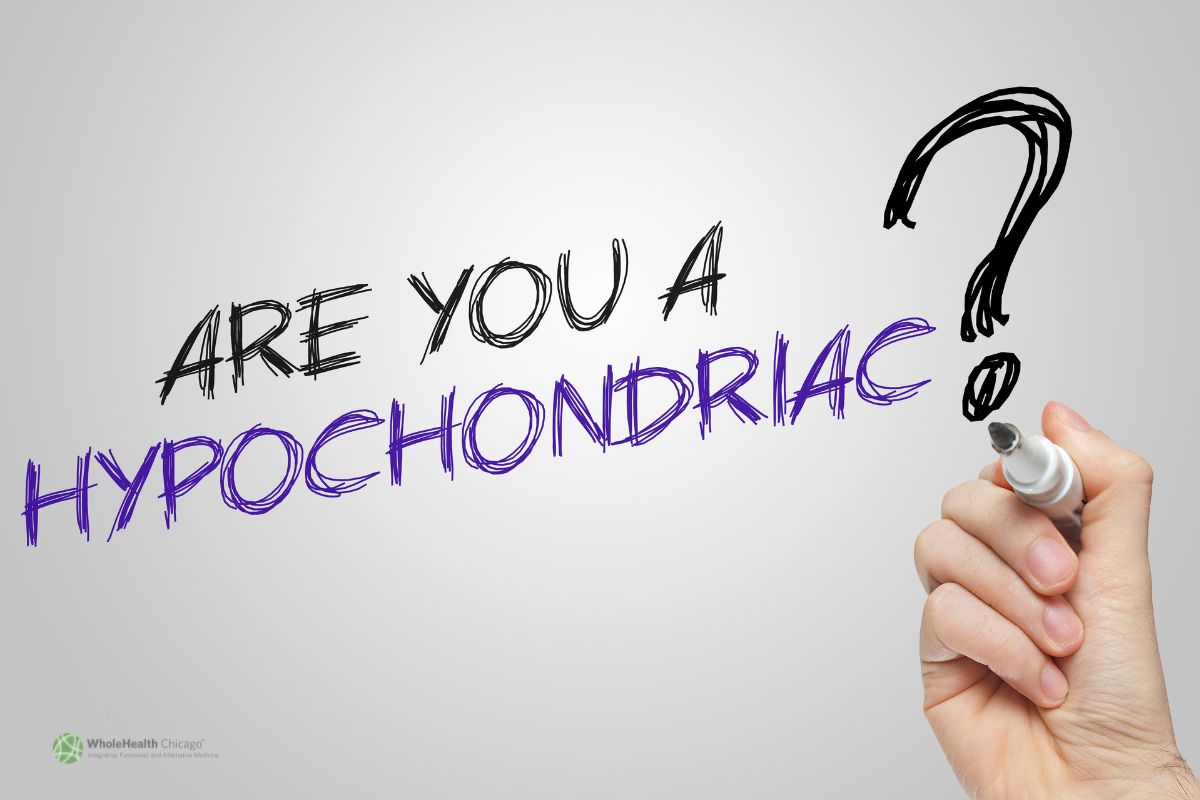Actually, after many years, the term has been changed to a more politically correct one: Illness Anxiety Disorder.
Naturally, some degree of anxiety is totally appropriate when you are confronted with anything that might bring you protracted physical discomfort or shorten your precious lifespan (“Could this be it? The top line item on my Death Certificate?”). But when months and even years go by and that sense of dread starts dominating your thoughts long after no illness has been found (“Maybe the doctors are missing something”), and you’ve heard that your tests were “normal” yet again, maybe you wonder (or your spouse wonders) if you might be a bit of a hypochondriac. You think “Maybe I need more tests. A different doctor. A different medical center, perhaps even THE MAYO CLINIC!”.
Now you’re entering the rabbit hole, the slippery slope, when I, as a Functional Medicine physician, start hearing sentences like, “You’re the fifteenth doctor I’ve seen for these symptoms and no one can find the cause,” or “the symptom’s not there today (in fact, I feel okay today) but I felt terrible last week,” and “Here are my tests—I know there’s quite a lot of material here.”
Well, first of all, you’re really not a hypochondriac which is a very judgmental term. Let’s agree that you’re a bit anxious simply because you want relief and some answers.
Part One: What Doctors Know and What They Don’t Seem to Know
When you present your symptoms (fatigue, chest pain, bloating, whatever) to your doctor, she was taught in medical school/specialty training to think in terms of “pathology/disease” and orders “tests” appropriate for her specialty to locate that disease. If tests are “negative”, you’re moved, assembly line style, to the next specialist in her mega-medical center, and the next, and you might end up with a big fat nothing. However, you’ll be told, “We couldn’t find a thing wrong with you!” (You might have a bit of PTSD from the whole shebang.). This is classic disease based medicine.
But, if your problems are not disease but dysfunction (hormones out of whack, poor digestion or imbalanced intestinal bacteria, susceptibility to black mold, Lyme, food sensitivities, nutritional deficiencies), you’ll likely be written off as a hypochondriac. Oh, pardon me, “Illness Anxiety Disorder”.
Part Two: The Entire Healthcare System Encourages Egregious Overspending with Little in Return
We currently spend 18% of our Gross Domestic Product (GDP) or about $5 Trillion a year on health care. This will rise by 5% a year to $7 Trillion a year by 2031. We outspend other Western countries despite declining lifespans, increased infant mortalities, and lots of other unpleasant parameters.
The two factors most responsible for this: fee for service and pharmaceuticals. Much to the chagrin of physicians and hospitals, the insurance industry does put some controls on fee for service charges but pharmaceuticals live life with an American Express Black Card.
For you with illness anxiety disorder, if you’ve got good insurance, you can have an excellent diagnostic workup at Northwestern including all tests and specialists. However, if you feel in any way dissatisfied, thinking you deserve “more”, take an Uber to Rush or the U. of C., not say a word that you’ve just left Northwestern, and have the entire workup repeated and covered by your insurance. Then, a few months later, fly to Rochester, MN, for Mayo to do the whole thing again.
Part Three: “Cyberchondriasis” can be much more dangerous than you think
Although I myself use the internet to keep up with advances in medicine, I began to notice several years ago how more and more patients were bringing in really bizarre stuff, wanting tests for illnesses for which they had nary a symptom. When I did further reading on the term cyberchondria I found it first used in British medical journal in 2001. The Brits have been tracking reasons for people coming to the doctor (remember, they’ve got National Health) and discovered that one out of every five visits was due to “something” read on the internet.
So “cyberchondria” can give you a lot of misinformation, making you even more anxious about illnesses you don’t have, or keeping you from a treatment that could save your life.
Part Four: What to do with “Illness Anxiety Disorder”
To me, the most important “take-away” is this: Your symptoms are real. No discussion here.
However, a “disease-based symptom” (like cancer, or an auto-immune illness, or an infection) starts at a certain time (say January 1st) and gets progressively worse fairly quickly (weeks to 2-3 months). Tests flip from “negative” to “positive”. Diagnosis is easier.
“Functional symptoms” (chronic fatigue, irritable bowel, migraine, mold biotoxin illness and many others) last for years, have good days and bad days, often elude diagnostic tests.
Conventionally trained physicians are not educated in functional illness.
They term “Adrenal Fatigue”, “Fibromyalgia”, “Chronic Lyme”, “Candida”, and many others, as “controversial”.
And you get labelled as a hypochondriac. Oh, sorry, “Illness Anxiety Disorder”.
And last, if you do feel so anxious about symptoms that you’re not able to function on a day-to-day basis, I recommend a therapist for Cognitive Behavioral Therapy. Patients with Illness Anxiety also respond to the SSRI group of antidepressants. These raise the neurotransmitter serotonin which acts as a stress buffer and can be useful to calm the obsessive thinking about your symptoms.
Be well,
David Edelberg, MD
